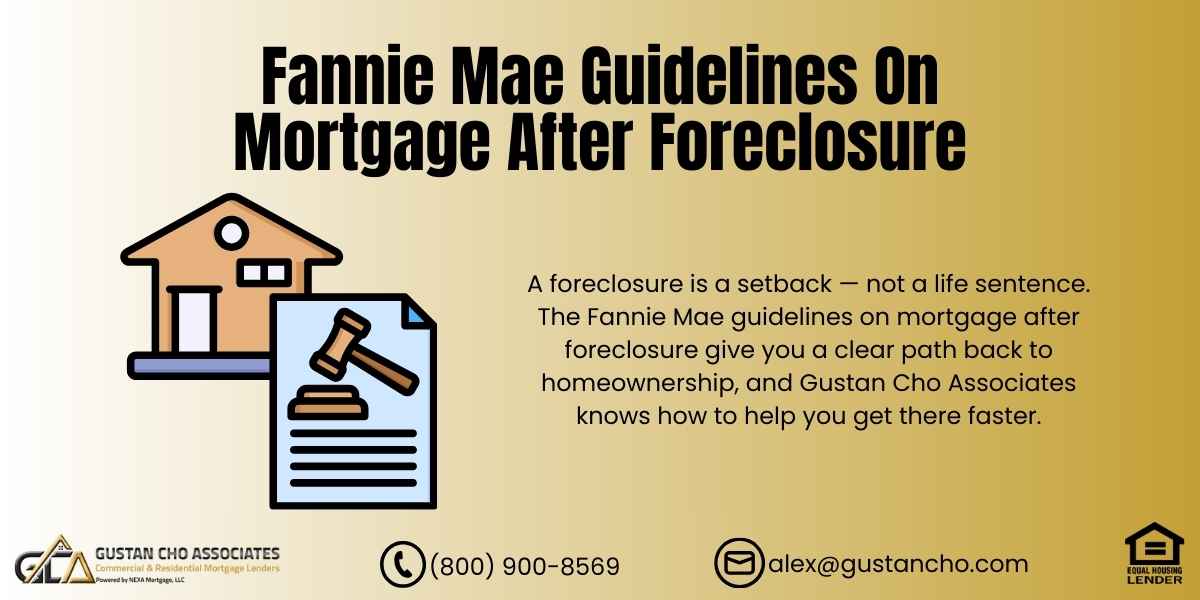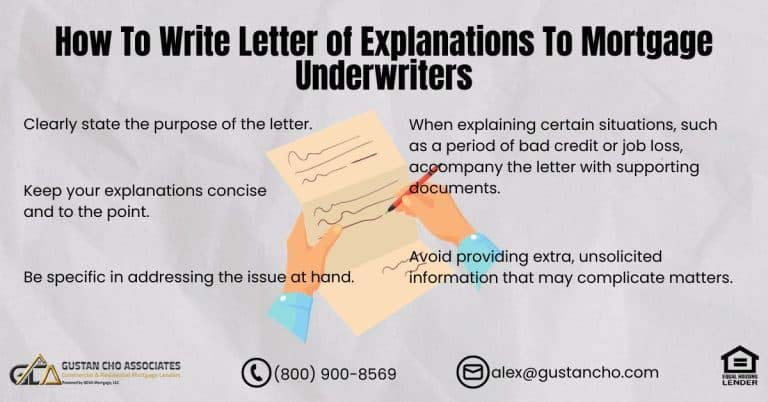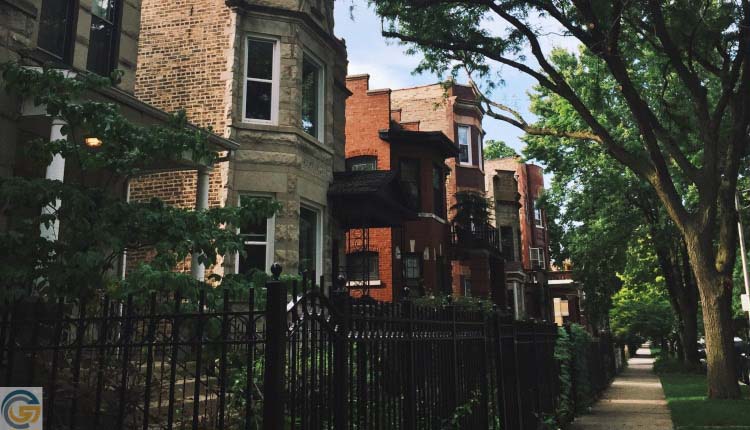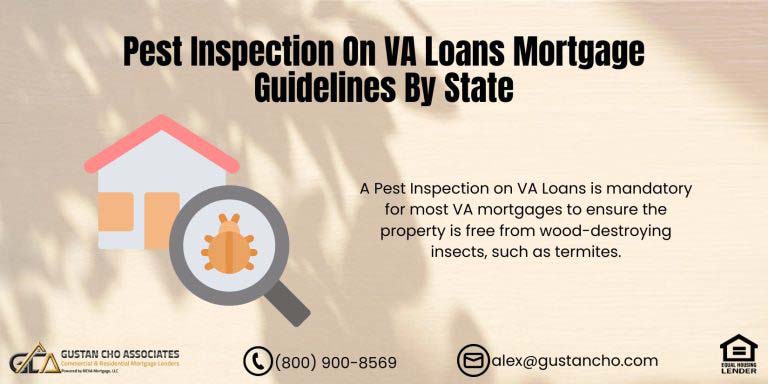Fannie Mae Guidelines on Mortgage After Foreclosure in 2026: How to Qualify Again Fast
If you’ve been through a foreclosure, you might wonder: “When can I buy a house again?” The good news is you can, and knowing the Fannie Mae guidelines on mortgage after foreclosure is the first step.
At Gustan Cho Associates, we specialize in helping borrowers who thought they had to wait forever to get a mortgage. Even if you’ve been turned down by other lenders, our team knows how to navigate the rules so you can own a home again.
In this guide, we’ll summarize everything you need to know about Fannie Mae guidelines on mortgage after foreclosure in 2026 — from waiting periods to special exceptions — in plain language.
Why Fannie Mae Guidelines on Mortgage After Foreclosure Matter
Fannie Mae is one of the two leading “mortgage giants” that set the rules for conventional loans (the other is Freddie Mac). If you want a conventional loan, your application must meet Fannie Mae’s guidelines before approval.
When you’ve had a foreclosure, deed in lieu, or short sale, Fannie Mae sets specific waiting periods before you can qualify for another mortgage. These rules differ from FHA, VA, and USDA loans, so knowing the exact timelines is important.
Understanding the Fannie Mae guidelines on mortgage after foreclosure will help you confidently plan your next home purchase — and avoid wasting time with lenders who don’t know the exceptions.
Ready to Buy Again After Foreclosure?
Learn Fannie Mae’s waiting periods and guidelines so you can plan your next move.
How Long After Foreclosure Can You Get a Mortgage With Fannie Mae?
Fannie Mae guidelines on mortgage after foreclosure requires different waiting periods depending on the type of housing event you experienced.
Here are the rules:
- Foreclosure: 7 years from the date the foreclosure is recorded (not when you moved out).
- Deed in Lieu of Foreclosure: 4 years from the completion date of the foreclosure action (as shown on your credit report/foreclosure documents).
- Short Sale: 4 years from the closing date listed on your settlement paperwork.
These timelines are non-negotiable unless you qualify for an exception, such as extenuating circumstances (we’ll cover that shortly).
Pro Tip from Gustan Cho Associates: Many borrowers think their waiting period started years ago, only to find out the bank didn’t officially record the foreclosure until much later. That recorded date is what matters.
Waiting Period Start Date: Why the Recorded Date Matters
Many people misunderstand when the timeline begins regarding Fannie Mae guidelines on mortgage after a foreclosure. The clock actually starts on the completion date of the foreclosure action (as shown on your credit report/foreclosure documents) when the foreclosure or deed in lieu is finalized in the county records, which is typically the date of the sheriff’s sale or trustee sale. It’s important to note that this timeline does not start when you return the keys, move out, or cease making payments.
This means if your bank delayed recording the foreclosure for years, your waiting period might still be running — even if you’ve been out of the house for a long time.
At Gustan Cho Associates, we help clients track down the exact recorded date so you know your real timeline.
How to Find Your Foreclosure “Completion Date”
Use this checklist to pin down the official completion date that most conventional underwriters use for Fannie Mae waiting periods (not the day you moved out or stopped paying).
1. Pull your full credit reports (all 3 bureaus)
- Get Equifax, Experian, and TransUnion, and look for:
- The mortgage tradeline status (foreclosure/charge-off)
- Any “foreclosure completed” or “date of first delinquency” fields
- Remarks that mention “foreclosure,” “sheriff/trustee sale,” or “claim filed”
2. Check your county recorder/land records
- Search by your name and the property address for:
- Trustee’s Deed Upon Sale (common in non-judicial states)
- Sheriff’s Deed (common in judicial states)
- Foreclosure deed/deed transfer documents
- Write down the recording date and the sale/auction date if shown.
3. Request the foreclosure case details (if it was judicial)
- If your foreclosure went through court, pull:
- Final judgment date
- Sale confirmation date (if your state issues one)
- Any document showing that the foreclosure action was completed
4. Get the lender’s final paperwork
- Ask the servicer/lender for:
- Final “foreclosure sale” statement (or similar)
- Any “property disposition” or “liquidation” notice
- If it were a deed-in-lieu, get the recorded deed-in-lieu copy
5. If Chapter 7 was involved, pull your bankruptcy documents
- Get your discharge order and schedules showing that the mortgage debt was included.
- Confirm you did not reaffirm the mortgage.
6. Compare all dates and use the most supportable “completion” evidence
- If your credit report date doesn’t match county records, underwriters often rely on the strongest third-party proof (county/court + lender docs).
- If dates conflict, a no-overlay lender can help you document the correct one.
Pro Tip: If you’re unsure, send your credit report + county document to a loan expert—misidentifying the completion date is one of the biggest reasons borrowers get denied or told to “wait longer.”
Short Sale Waiting Period Rules
If you sold your home in a short sale — where the lender accepted less than the amount owed — the waiting period is shorter than foreclosure.
Under the Fannie Mae guidelines on mortgage after foreclosure, a short sale has a 4-year waiting period, starting from the date on your closing paperwork (Closing Disclosure).
Special Rule: Mortgage Included in Bankruptcy
Fannie Mae guidelines on mortgage after foreclosure has a unique exception for borrowers whose mortgage was included in a Chapter 7 bankruptcy.
Here’s how it works:
- The waiting period is 4 years from the bankruptcy discharge date, even if the foreclosure was recorded later.
- The mortgage must have been included in the bankruptcy filing.
- You cannot have reaffirmed the mortgage during bankruptcy.
This rule is huge because it can save borrowers years of waiting time compared to FHA or VA guidelines.
At Gustan Cho Associates, we see this mistake all the time: borrowers think they have to wait 7 years after foreclosure when they actually qualify in 4 years because their mortgage was discharged in bankruptcy.
Foreclosure Doesn’t Mean Forever
Understand the Fannie Mae rules for getting a mortgage after foreclosure.
Extenuating Circumstances: Can You Shorten the Waiting Period?
Yes — but it’s rare. If you can prove extenuating circumstances, Fannie Mae allows a shorter waiting period (3 years for foreclosure, 2 years for deed in lieu or short sale).
Examples include:
- Serious illness or disability
- Death of the primary wage earner
- Other unavoidable financial hardship beyond your control
You’ll need strong documentation to qualify for this exception; not all lenders allow it. Gustan Cho Associates works with wholesale lenders who will consider these cases.
How Fannie Mae Differs From FHA, VA, and USDA After Foreclosure
While this article focuses on Fannie Mae guidelines on mortgage after foreclosure, it’s helpful to compare them to government-backed loans:
- FHA: 3 years after the recorded foreclosure date
- VA: 2 years after the recorded foreclosure date
- USDA: 3 years after the recorded foreclosure date
If you want to buy sooner than 4–7 years, FHA or VA loans may be a better short-term option — and Gustan Cho Associates can help you compare them side-by-side.
Real-World Scenarios: How the Waiting Period Really Works
Scenario 1: “I moved out years ago… but the foreclosure was completed later.”
What happened:
You stopped making payments and moved out in 2018, but your lender didn’t finish (or report) the foreclosure completion until 2020.
Why this matters:
For conventional loans, underwriters generally rely on the foreclosure completion date documented on your credit report and/or verified through county/court records—not the day you moved out or the first missed payment. If the foreclosure action wasn’t completed until later, your waiting period may start later than you expect.
What to do next (fast fix):
- Pull your tri-merge credit report and identify the mortgage tradeline remarks.
- Check county recorder documents (trustee’s deed/sheriff’s deed) for sale/recording evidence.
- If dates conflict, have your lender document the most supportable completion date with third-party records.
Bottom line:
This is the #1 reason borrowers are told, “You still have time left,” even though they thought their wait was over.
Scenario 2: “My Chapter 7 was discharged… but the foreclosure finished later.”
What happened:
You filed for Chapter 7 and got your discharge in 2019. The mortgage was part of that, but the property wasn’t foreclosed until 2021.
Why this matters:
In some cases, conventional underwriting may allow the waiting period to be measured from the Chapter 7 discharge date rather than the later foreclosure completion—if the lender can document that the mortgage debt was discharged and that the borrower did not reaffirm the debt. If not properly documented, the lender may apply the longer waiting period.
What to do next (documentation checklist):
- Bankruptcy discharge order
- Bankruptcy schedules showing the mortgage debt were included
- Proof you did not reaffirm the mortgage
- Credit report showing the mortgage was discharged/zero balance (or lender/servicer letter if needed)
Bottom line:
This scenario can potentially save years—but only if your file is documented correctly.
Scenario 3: “I have extenuating circumstances… but I want an investment property.”
What happened:
You had a foreclosure because of a serious illness or another qualifying hardship. You’re now financially stable and want to buy a rental/investment property.
Why this matters:
Even when an extenuating circumstances exception is approved (shorter waiting period), Fannie Mae places extra restrictions during the shortened period—commonly limiting eligibility to a principal residence and restricting certain transaction types and LTV. In plain English: you might qualify sooner, but you may be limited to buying a primary home, not an investment property, until the full waiting period has passed.
What to do next (best strategy):
- If your goal is homeownership, plan for a primary residence first during the shortened window.
- If your goal is investing, you may need to wait for standard eligibility—or explore other loan types that fit your timeline (on a case-by-case basis).
Bottom line:
Extenuating circumstances can shorten the clock, but it doesn’t always expand what you can buy right away.
Why Gustan Cho Associates Is Different
Many banks add lender overlays — extra rules beyond Fannie Mae’s minimum guidelines. They might tell you you’re not eligible for 10 years after foreclosure when the official rule is 7 years.
At Gustan Cho Associates, we have no lender overlays on conventional loans. If you meet the Fannie Mae guidelines on mortgage after foreclosure, we can get you approved — even if other lenders said no.
We also:
- Work in 48 states, including DC, Puerto Rico, Guam, and the U.S. Virgin Islands
- Offer same-day pre-approvals
- Have access to 280+ wholesale lenders for the best rates and programs
Steps to Qualify for a Conventional Loan After Foreclosure
If you’re ready to buy again, here’s how to move forward:
1. Find Your Recorded Date
Get a copy of the foreclosure, deed in lieu, or short sale recording from your county records.
2. Check Your Credit Report
Make sure the housing event is reported correctly. Dispute any errors before applying.
3. Meet Credit and DTI Requirements
Most Fannie Mae loans require a minimum credit score of 620 (though higher scores may get better rates) and acceptable debt-to-income ratios.
4. Save for Down Payment
Conventional loans usually require at least 3–5% down, depending on your situation.
5. Work With a No-Overlay Lender
Gustan Cho Associates will ensure your file meets Fannie Mae guidelines on mortgage after foreclosure without unnecessary extra rules.
Documentation Checklist: What Underwriters Will Ask For
When you apply for a conventional loan after a foreclosure, underwriters aren’t just checking your score—they’re verifying the event type, the official completion date, and that your waiting period is satisfied using your credit report and/or other foreclosure documents according to Fannie Mae guidelines on mortgage after foreclosure.
1) Proof of the foreclosure event + completion date
Underwriters typically want at least one of the following (sometimes more if dates conflict):
- Credit report evidence showing the foreclosure completion date (or equivalent reporting)
- County/court documents such as:
- Trustee’s Deed Upon Sale / Sheriff’s Deed
- Foreclosure deed/sale confirmation (if applicable)
- Recorded deed-in-lieu (if that was the event)
- Lender/servicer documentation that supports the final disposition date
If the dates shown on the credit report are incomplete or unclear, the lender must confirm the waiting period has been met using other documentation.
2) A short “Letter of Explanation” (LOE) about the foreclosure
Expect to write a brief LOE that covers:
- What happened (high-level, factual)
- When it happened (month/year)
- What’s changed (income stability, savings, payment history since)
3) Standard credit and housing documentation
Underwriters commonly request:
- Most recent 12–24 months housing history (rent verification if applicable)
- Proof of any disputes was resolved (or removed) if they affect underwriting
- Evidence that any new derogatory items after the event are addressed
4) Income, employment, and asset verification (DU findings)
Your DU/automated underwriting findings will drive the exact list, but commonly:
- Pay stubs, W-2s, tax returns (if self-employed), and/or 1099s
- Bank statements for down payment, closing costs, and reserves
- Documentation for large deposits (if required by findings)
Special Case A: If your mortgage was included in a Chapter 7 bankruptcy
Underwriters may ask for:
- Bankruptcy discharge order
- Bankruptcy schedules/filing showing the mortgage debt was included
- Evidence that you did not reaffirm the mortgage
- Any supporting credit report/lender documentation tying the discharged debt to that mortgage (if needed)
This matters because the waiting period calculation can vary depending on the documentation.
Special Case B: If you’re using extenuating circumstances to shorten the wait
Underwriters typically require:
- A written explanation from you linking your documents to the hardship
- Documentation proving the hardship was beyond your control (medical records, death certificate, disability documentation, etc.)
- Proof the event was isolated and you re-established stability
Common Mistakes Borrowers Make
- Assuming the waiting period started when they moved out.
- Applying with a bank that has stricter rules than Fannie Mae.
- Forgetting to check if their mortgage was included in bankruptcy.
- Waiting longer than necessary because they didn’t know the exceptions.
2026 Update: What’s New in Fannie Mae Guidelines
As of 2026, the core waiting periods in the Fannie Mae guidelines on mortgage after foreclosure have not changed from prior years. However:
- Lenders are using Desktop Underwriter® (DU) more aggressively to approve borderline cases.
- Credit score requirements remain at 620 minimum, but higher scores can help offset a past foreclosure.
- Interest rates for post-foreclosure borrowers are often slightly higher, but competitive shopping through wholesale channels (like ours) can close that gap.
Fast-Track Your Return to Homeownership
Discover exceptions and strategies to buy sooner after foreclosure.
Final Thoughts: You Can Buy Again
A foreclosure is a setback — not a life sentence. The Fannie Mae guidelines on mortgage after foreclosure give you a clear path back to homeownership, and Gustan Cho Associates knows how to help you get there faster.
Whether your waiting period is over or you think it might be, we can review your timeline, check for bankruptcy exceptions, and get you pre-approved.
Borrowers who need a five-star national mortgage company licensed in 50 states with no overlays and who are experts on Fannie Mae guidelines on mortgage after foreclosure, please contact us at 800-900-8569, text us for a faster response, or email us at alex@gustancho.com.
We’re available 7 days a week, evenings, weekends, and holidays to help you become a homeowner again.
Frequently Asked Questions About Fannie Mae Guidelines on Mortgage After Foreclosure:
How Long After a Foreclosure Can You Get a Conventional Loan?
If you’re looking to get a conventional loan from Fannie Mae or Freddie Mac, keep in mind that you usually need to wait 7 years after a foreclosure. This countdown starts from the date the foreclosure is officially completed, which you’ll find on your credit report or other related documents.
What are the Fannie Mae Guidelines on Mortgage After Foreclosure?
They’re the eligibility rules Fannie Mae uses for conventional loans, including the waiting period, how it’s measured, and the documentation required—plus limited exceptions, such as extenuating circumstances.
When Does the Foreclosure Waiting Period Start for Fannie Mae?
It’s measured from the completion date of the foreclosure action (as supported by the credit report and/or foreclosure documents), not the day you moved out or stopped paying.
How Long After a Deed in Lieu Can You Get a Conventional Loan?
Typically, 4 years after a deed in lieu (similar to short sale/pre-foreclosure sale rules), unless you qualify for an extenuating-circumstances exception.
How Long After a Short Sale Can You Get a Conventional Loan?
Typically, 4 years after a short sale/pre-foreclosure sale, with a possible shorter path only in limited extenuating circumstances.
Can You Get a Mortgage Sooner with “Extenuating Circumstances”?
Sometimes. Fannie Mae may allow a shorter waiting period (often 3 years) if extenuating circumstances are documented, but additional restrictions apply during the shortened window (for example, limits on transaction type/occupancy and other requirements).
If My Mortgage was Included in Chapter 7 Bankruptcy, do I Still have to Wait 7 Years After Foreclosure?
Not always. Depending on how the mortgage debt was handled and documented, lenders may be able to apply the bankruptcy waiting period rules rather than the longer foreclosure timeline—but documentation is key (discharge, schedules, no reaffirmation).
What Credit Score do I Need for a Conventional Loan After Foreclosure?
Many conventional programs start around 620, but requirements vary by lender and the overall strength of the file (DTI, reserves, down payment). Higher scores typically improve pricing and approvals.
How Can I Improve My Chances of Approval After a Foreclosure?
Focus on: consistent on-time payments, lowering credit utilization, avoiding new major derogatories, documenting stable income, building reserves, and ensuring the foreclosure dates are correctly supported by third-party records.
Does a Foreclosure Fall Off Your Credit Report After 7 Years?
In many cases, a foreclosure can stop appearing after about 7 years (timing can vary by reporting and the specific credit file), but lender eligibility is based on the mortgage program’s waiting period rules, not only whether it’s visible on the report.
This article about ”Fannie Mae Guidelines On Mortgage After Foreclosure” was updated on January 28th, 2026.
From Foreclosure to New Keys in Hand
Fannie Mae’s guidelines may allow you to buy again sooner than you think.











Fannie Mea in Florida Stole a house from my daughter and me cause of her dad’s death.
They never allowed her and me a chance to pay a small mortgage left. One year before his death the house was only worth 70,000 and when he died the house was worth 124,000 so they wanted that profit and literly denied my daughter and me a chance to pay what was owed, even though there was a special deed saying I could help save the house and that was even in my devorce papers. But Fannie mea wanted to make a profit off the death of my daughter’s father and my ex husband. The lawyer involved even allowed a family member go into house and steal everything in house. There are several complaints filed and we won’t let Fannie mea steal from us.